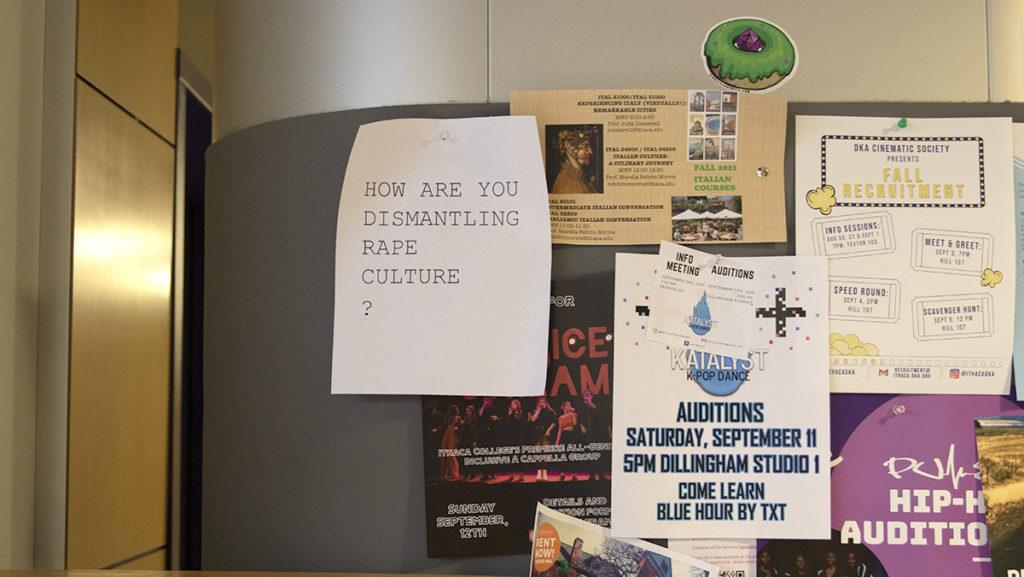Scattered all across the Ithaca College campus are booklets with the words “Don’t Be Friends With Rapists” printed in a bold font, along with posters that say “Believe Survivors,” “How Are You Dismantling Rape Culture?” and “Believe Survivors, Not Gossip.” First circulated anonymously, the zine and posters are part of one senior’s campaign to call attention to the importance of sexual violence prevention.
The zine covers the topics of victim blaming, rape culture, allyship and bystander intervention. The zine addressed that consent is essential and that victims of sexual violence are never at fault for the actions of perpetrators. It also mentioned the lack of reporting that happens, what rape culture sounds like and, through tweets and data, made connections to how culture impacts reporting. Senior Aiden Nelson, author of the zine, said they wanted to let the college community have organic reactions to the zine, which is why they did not attach their name to it. Nelson said now that some time has passed and the community was able to have an uninfluenced perspective of the zine, they felt comfortable coming forward as the author.
Nelson said they began putting up the posters in early September and said the zine was the next step. Although they distributed the zine independently, they are currently a member of IC Strike, a student organization that focuses on education, activism and allyship for survivors of sexual violence.
“In my head, the ideal situation was like, it’ll make survivors feel validated in their anger and potentially make people uncomfortable with how they handle themselves and make them actually question [their actions],” Nelson said.
Out of all college-aged students in the United States, 13% reported experiencing rape or assault according to the Rape, Abuse & Incest National Network (RAINN). Approximately 51.1% of female survivors were raped by an intimate partner and 40.8% of female survivors were raped by an acquaintance according to the National Sexual Violence Resource Center (NSVRC).
The college has prevention tools like the Rave Guardian app and the Safe Escort Program. The Rave Guardian app provides safety alerts, quick access to emergency contacts, access to college emergency resources and the Guardian Timer which a student can use to invite someone else to virtually escort them to and from a location. The Safe Escort Program provides members of the campus community with someone to accompany them to and from anywhere on campus.
Nelson said these tools provided by the college are not going to prevent many instances of sexual violence because most survivors know the perpetrator and are assaulted in private settings. According to RAINN, 55% of sexual assaults occur at or near the victim’s home.
Nelson also said they think the consent education training that takes place during orientation is not enough because the conversation needs to be a more regular occurrence on campus.
“When you first come to IC, you’re just bombarded with information and [the consent training] is just another box you have to tick,” Nelson said. “I know that I did take it, but I don’t remember the information that was provided within the little course.”
Linda Koenig, Title IX coordinator in the Department of Legal Affairs, said bystander intervention is crucial to creating a safer campus community. A recent initiative that Koenig is a part of is called IC Responsibility (ICR), which aims to give students the tools to be socially responsible and caring community members. The program takes students through a range of workshops that all revolve around learning to be a good member of society. Some topics included are bystander intervention, first responder training, identities, privilege and mental health. Once the foundational workshops are completed, students can proceed by specializing in one topic.
“[Being an ally means] being able to recognize there’s a problem, knowing what the resources are and then understanding how to deliver that information in a way that really empowers [a survivor],” Koenig said.
Natasha Bharj, assistant professor in the Department of Psychology, is also a board member of ICR. She mentioned the importance of unlearning rape myths to deconstruct rape culture. Rape myths are false beliefs about how and why rape occurs. A common example of a rape myth is that it is not “real” rape if the victim does not physically fight back. The point of rape myths is to excuse assault and normalize rape culture by victim blaming.
“One of the issues is that society gives people so many ways to rationalize harming another person,” Bharj said. “So yeah, a lot of those kind of rape myths are around kind of providing that validation.”
The zine specifically highlighted the idea of not accepting behaviors that contribute to rape culture. Rape culture is a term that describes how society enables victim blaming and normalizes sexual violence, according to Women Against Violence Against Women (WAVAW). Bharj said a really important part of bystander intervention is helping people to understand when someone else is doing something wrong as well as to be aware of your own behavior and then knowing what to do about it.
“It can be really difficult to call out your own friends,” Bharj said. “So giving people tools and models for how to do that and changing the norms on campus, that is the idea of [ICR] … The idea that we can excuse [sexual violence] it is all kind of tied up in these, like, rape myths and dismissal of survivors.”
The zine claimed most women know a survivor, but many men do not know a perpetrator of sexual violence. Kristi Taylor, education director for the Advocacy Center of Tompkins County, said even the language used to talk about sexual violence feeds into rape culture. She said when people say “violence against women” it instills the idea that sexual violence is a passive experience women have while erasing the perpetrator from the situation.
“I think it’s wrapped into a larger piece around who gets to control the narrative and who has the power in our culture, which is, of course, around rape culture,” Taylor said.
Koenig said supporting survivors in addition to violence prevention is extremely important. At the college, there were 13 reported cases of rape in 2018, 14 in 2019 and 10 in 2020.
“It’s never too late to make a report to my office,” Koenig said. “Making a report doesn’t automatically mean there’s going to be an investigation. What it means is that you’ll engage with my office in a conversation about what are the things that will support you the most.”









